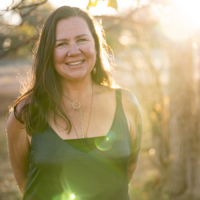
Like most people, I am watching the unfolding of events in the West Bank with sadness, confusion, and a good dose of fear.
As a woman recently married into a Jewish family, I feel more directly impacted than previous conflicts in the region.
I am watching my family and friends posting about the bombings, kidnappings, and real-world consequences of this violent conflict that has been declared a war.
As a practitioner steeped in the teachings of Tibetan Buddhism, I rarely watch or engage the news. I know that we live in a realm rooted in deep suffering and don’t need pundits to remind me. I know that the ultimate way to affect change in the world is to affect change in my own heart. Yet, here I am, reading, listening, and trying to grasp onto an answer to a complicated situation as old as Abraham.
I want resolve. I want peace. I want to find resolution via the nominal ways they appear: political leaders, diplomacy, and a peaceful strategy fueled by the fear of potential nuclear consequences. Like most of us, I am searching for ground in a groundless world.
Pema Chödrön writes in her book, Practicing Peace in Times of War,
“When we’re putting up the barriers and the sense of ‘me’ as separate from ‘you’ gets stronger, right there in the midst of difficulty and pain, the whole thing could turn around simply by not erecting barriers; simply by staying open to the difficulty, to the feelings that you’re going through; simply by not talking to ourselves about what’s happening. That is a revolutionary step…Let difficulty transform you. And it will. In my experience, we just need help in learning how not to run away.”
How do we learn not to run away? How do we allow this latest war to transform us no matter how close or far we feel to the conflict?
When confronted with times like these, I find the first place I go to is how I can help.
Here are three actionable things we can all do right now that will help bring about more peace and less division in our hearts and by extension the world:
1. Come together in community.
As the founder of the online space Mind Oasis, upon learning of the declaration of war, I pulled together a “Practice for Peace” event. Taking this step toward bringing together sentient beings to practice LovingKindness together in community immediately soothed my upregulated nervous system.
You might not have thousands of people to bring together, but you do have friends who could join you in prayer, meditation, or even a candle vigil to stand in solidarity with all beings affected by violence, war, and division. Bring them together over tea or wine and share your fears, hope, and desire for peaceful resolution. Listen to John Lennon’s song, “Imagine” and talk about the resonance in your heart.
2. Engage LovingKindness or Tonglen meditation practices.
LovingKindness is the practice of using a specific meditation to evoke friendliness, care, and empathy toward oneself and others, including those who may feel like frenemies or downright enemies. We send care and empathy to all sentient beings, starting with ourselves.
Tonglen is like LovingKindness but on steroids. In this ancient Buddhist practice of “taking and sending,” we take in others’ pain on the inhale and send out relief on the exhale in order to awaken deep and profound compassion for all sentient-beings.
Both practices take what appears as suffering outside of us and connects us with the suffering in our own hearts. This is a fairly radical way of experiencing life when most news media outlets and society encourage us to stay safe and protected. These age-old Buddhist practices turn that on its head and say, “Bullshit! Get into the ring! We are all interdependently connected. Take responsibility and help. Help now!”
3. Recognize we are a part of the problem and therefore have to be part of the solution.
I understand this can feel overwhelming and dare I say, radical. However, as I noted earlier this year in my article about His Holiness the Dalai Lama and the cancel-culture moment he encountered, this is a “perfect moment to remember that everything we experience is an opportunity to learn anew and to use it to clean up our own act.”
Here are some examples of how to do this:
Notice the places we act out violently (i.e. killing insects instead of relocating). Feel into the places in our heart where we haven’t been able to forgive ourselves and others, and do it now. Slow down and drive as if there is precious cargo all around us, and so forth. These microaggressions we all engage in contribute to the macroaggressions like we are seeing in Ukraine, Israel, and places of undeclared and dare I say forgotten wars in places like Yemen, Niger, and Ethiopia.
Join me in letting difficulty transform you. Move from silence, awe, and fear into power, influence, and the path of the helper from your own heart. In your own living room.
Don’t wait for others to do the work for you. Take radical responsibility for how you experience your world.
~
Please consider Boosting our authors’ articles in their first week to help them win Elephant’s Ecosystem so they can get paid and write more.
 Share on bsky
Share on bsky

Read 7 comments and reply